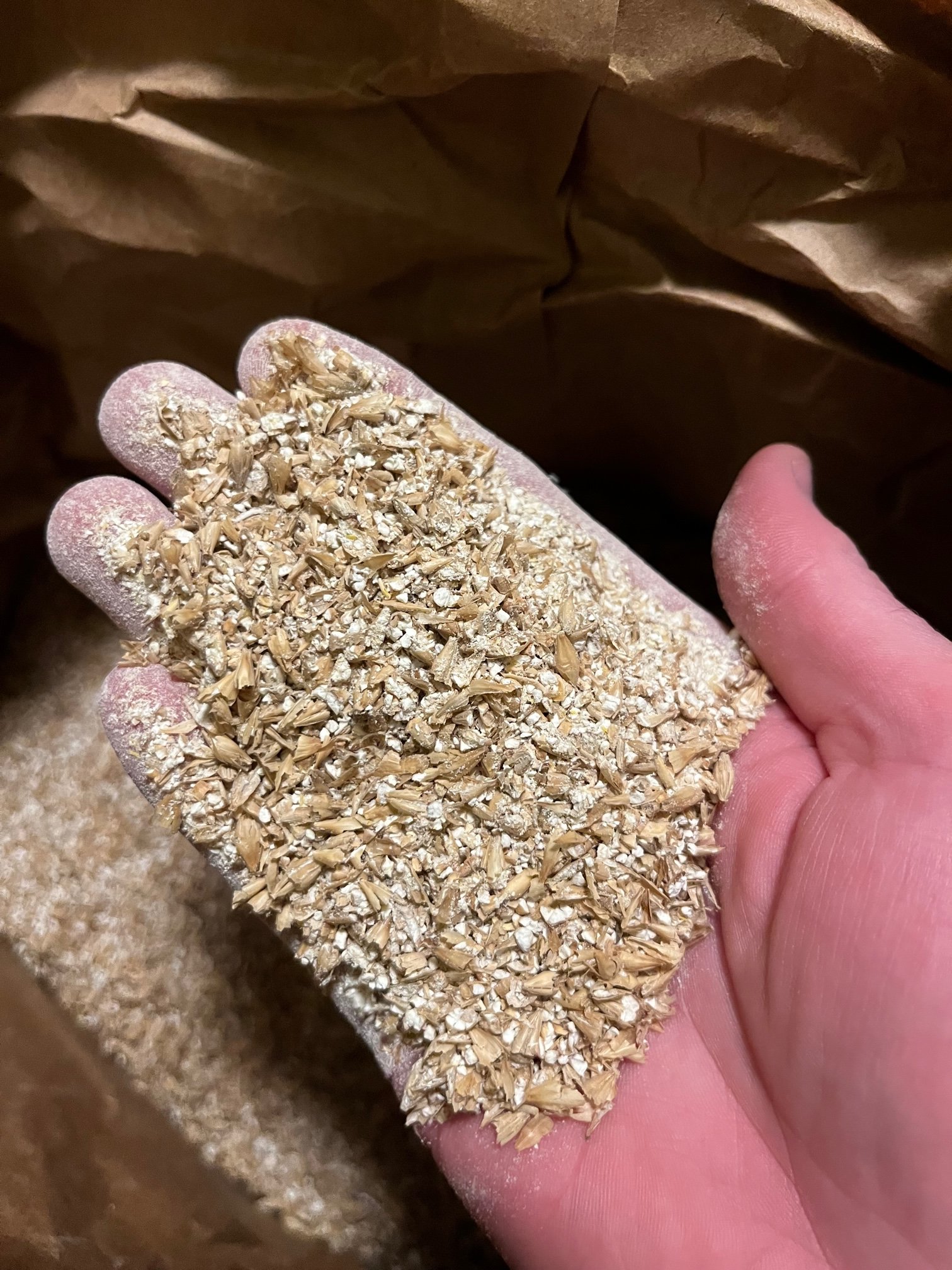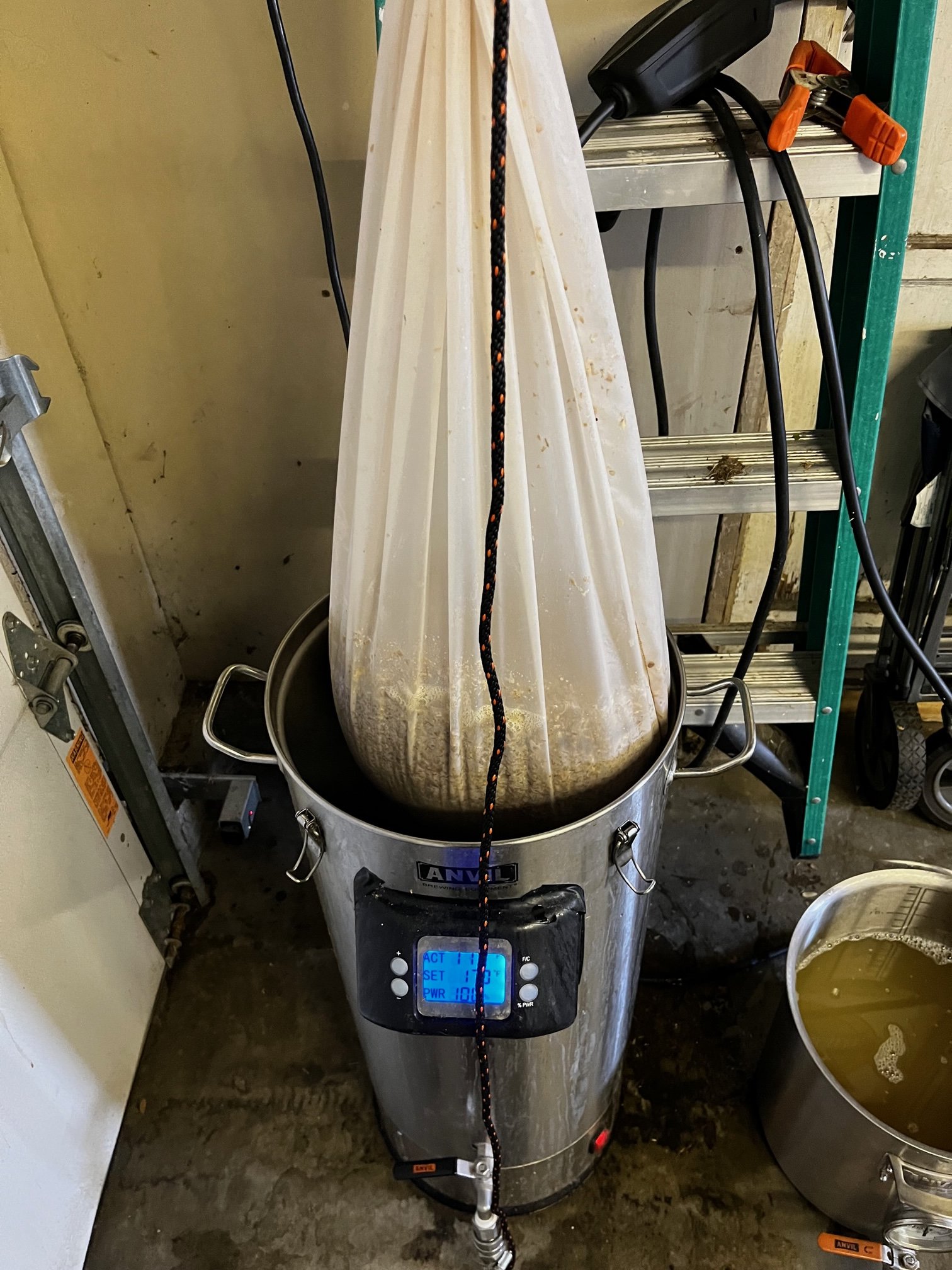capt_yo55arian
Well-Known Member
Might be a little overdramatic here, but if someone can talk me off a ledge, that'd be great.
After several full volume BIAB brews in the mid to low 60% efficiency, I figured I'd try a sparge to see if this would bump my efficiency. I told the LHBS to double crush, but honestly grains looked the same as previous.
Equipment Anvil Foundry 10.5
Put about 4.75 gallons of water in the mash, 90 min later, lifted grain bag, put inside Anvil grain pipe, sparged with 3.2 gallons of water (using a pump). Noticed at the end I was about .4 gallons above what I was aiming for. Took a gravity read and was at 1.026. Aiming for 1.038. Confirmed with another hydrometer. Went with a 90 min boil instead of 60, threw some DME in there, and ended with 1.037, target was 1.047. Approx brewhouse efficiency is 54%.
For the recipe, it was a Kentucky Common and I decided to just use filtered tap water (first time not using distilled with brewing salts). Didn't take a PH. Mashed @ 152.
I'm thinking of buying a Corona mill and giving the grains an extra crush after I get them from the LHBS but if anyone has any suggestions that would be awesome. Just kinda disheartening to go through all these extra steps and miss the mark even more so. And then to have to sit and ponder it until this is ready to keg.
- UPDATE -
In the middle of a brew day, and this one is going much better.
Saison--
9# Pilsner
1# Wheat
1# Vienna
4oz Victory
8oz Sugar
Beersmith telling me my pre-boil gravity should be 1.051(72% BH efficiency) and after a few refractor measurements, some a little high some low, its looking like 1.049.
Gravity Reading in kettle after mash - 1.07
" sparge water - 1.009
" sparge and kettle combined - 1.035
" with sugar added - 1.049
(volumes were hit)
I did not get a grain mill (yet) but I told the LHBS to crush fine. This was the consistency:

Would like to hear anyones thoughts on this crush.
Here's the bag after the dunk sparge:

OG was at 1.058 (estimated at 1.062) for a BH Efficiency of 67%. Man, not sure how some of you are hitting 70-80 w/BIAB, but im pretty satisfied with todays brewery. Hope to improve next time by utilizing PH meter and milling own grains.
After several full volume BIAB brews in the mid to low 60% efficiency, I figured I'd try a sparge to see if this would bump my efficiency. I told the LHBS to double crush, but honestly grains looked the same as previous.
Equipment Anvil Foundry 10.5
Put about 4.75 gallons of water in the mash, 90 min later, lifted grain bag, put inside Anvil grain pipe, sparged with 3.2 gallons of water (using a pump). Noticed at the end I was about .4 gallons above what I was aiming for. Took a gravity read and was at 1.026. Aiming for 1.038. Confirmed with another hydrometer. Went with a 90 min boil instead of 60, threw some DME in there, and ended with 1.037, target was 1.047. Approx brewhouse efficiency is 54%.
For the recipe, it was a Kentucky Common and I decided to just use filtered tap water (first time not using distilled with brewing salts). Didn't take a PH. Mashed @ 152.
I'm thinking of buying a Corona mill and giving the grains an extra crush after I get them from the LHBS but if anyone has any suggestions that would be awesome. Just kinda disheartening to go through all these extra steps and miss the mark even more so. And then to have to sit and ponder it until this is ready to keg.
- UPDATE -
In the middle of a brew day, and this one is going much better.
Saison--
9# Pilsner
1# Wheat
1# Vienna
4oz Victory
8oz Sugar
Beersmith telling me my pre-boil gravity should be 1.051(72% BH efficiency) and after a few refractor measurements, some a little high some low, its looking like 1.049.
Gravity Reading in kettle after mash - 1.07
" sparge water - 1.009
" sparge and kettle combined - 1.035
" with sugar added - 1.049
(volumes were hit)
I did not get a grain mill (yet) but I told the LHBS to crush fine. This was the consistency:

Would like to hear anyones thoughts on this crush.
Here's the bag after the dunk sparge:

OG was at 1.058 (estimated at 1.062) for a BH Efficiency of 67%. Man, not sure how some of you are hitting 70-80 w/BIAB, but im pretty satisfied with todays brewery. Hope to improve next time by utilizing PH meter and milling own grains.
Last edited:










![Craft A Brew - Safale S-04 Dry Yeast - Fermentis - English Ale Dry Yeast - For English and American Ales and Hard Apple Ciders - Ingredients for Home Brewing - Beer Making Supplies - [1 Pack]](https://m.media-amazon.com/images/I/41fVGNh6JfL._SL500_.jpg)
















































